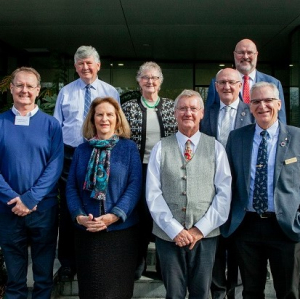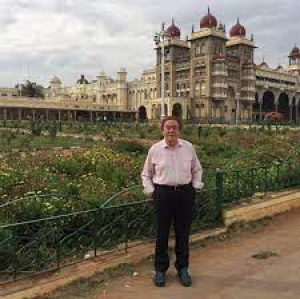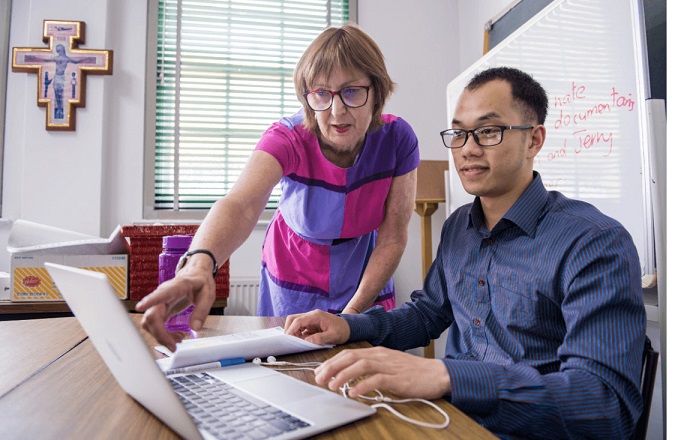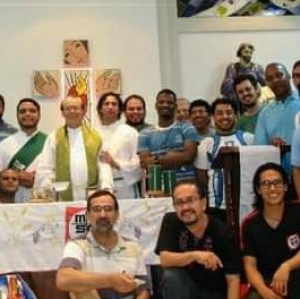Peter MALONE
Forger, The
THE FORGER
Germany, 2022, 116 minutes, Colour.
Louis Hofman, Jonathan Berlin, Luna Wedler, Nina Gummich, Marc Limpach, Andre Jung.
Directed by Maggie Peren.
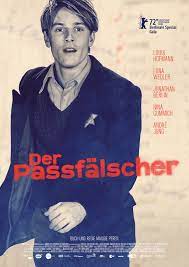 Berlin, 1942. This is the story of a young Jewish man, Ciomo (and based on his memoir written in later years). His family have been transported to the camps in the east.
Berlin, 1942. This is the story of a young Jewish man, Ciomo (and based on his memoir written in later years). His family have been transported to the camps in the east.
The Berlin of 1942 is not so much a target of Allied attack but rather a town with deprivations and rations. As the film progresses, there will be the experience of bombings. So, this film provides something of a glimpse of what life was like for ordinary citizens in Berlin at the time.
Ciomo works in a munitions factory but has a background in art education and these are his ambitions. A fellow-worker suggests that he contact a Christian minister who is involved in preparing documents, passports, forgeries, permits, to help people escape. Ciomo is not an idealist and goes along with the plan, sharing his apartment with another Jewish young man, their pretending to be part of the German Navy, going to clubs, the high life, Ciomo meeting a young woman who survives by contact with men and falls in love with her.
In the meantime, his landlady, loyal but against the greed of authorities, arranges for Ciomo’s family possessions to be sold in secret to local women. The pastor then finds accommodation for Ciomo who contrives to be fired from his job and spends full-time on the forging.
There are always dangers and he wants to forge a document for himself, especially when the pastor is arrested as is his friend whom he cannot save. He enlists the unwilling help of the landlady and eventually is successful in escaping.
It is interesting that the forger himself is not presented as heroic, rather an ordinary person who responds to a situation, some self-centred motivations, but who eventually can be seen as contributing to the safety of thousands of people.
- A Berlin 1942 story, ordinary living, rationed living, food shortages, coupons, the contrast with expensive restaurants? The movement of elderly Jewish people to the concentration camps? Young Jewish men still in Berlin, working in the factories? Atmosphere, the threats?
- The recreation of the city, costumes, décor, apartment blocks, the streets, church offices, the restaurants, the factory floors? The musical score?
- The film based on the memoir of the central character, character, exploits, the war, forgeries, hoping others, in self-preservation, after the war, living a long life?
- Audience response to Hitler, German loyalties to Hitler, the war experience, the persecution of the Jews, the concentration camps?
- The opening, the introduction to Ciomo, Lost and Found, his wallet, intruding, having to wait? Then the transition to his apartment, the story of his parents and grandmother, the concentration camps, the apartment and their possessions, the inspector coming and listing them, the threats, sealing the door? His friendship with Det, Det and his family, concentration camps, wanting to stay with Ciomo? Sharing coffee, food, hardships?
- Ciomo, age, his clocks, getting up, the bus, to work, on time, filing the pipes, the severe boss? Later being late, pretending about the appendicitis, not going to hospital, being sacked? His being free to do the forgeries?
- His background and art school, copying, finesse? The suggestion to meet Mr Kaufmann, the interview, the prospect of doing the forgeries, the passports, other documents? Kaufmann, his religious background, secrecy from his wife? Coordinating the team for forgeries? Helping thousands?
- Ciomo, the initial forgery, Kaufmann’s warnings, yet the open door, the discussions with Det, his first work, Kaufmann and the criticisms? The close-ups of him at work, his tools, the links, pens, erasures, the precise work? his improving? And the forgery of the seal for the apartment, opening it up, the women from the market, getting their possessions, Mrs Peters and her threat?
- Mrs Peters, anti-the establishment and their selfishness, her threats to show more, paying for the lamp, arranging for all the sales and getting the money? Ciomo later returning, the threats, her allowing him to stay, getting the document for him, for the forgery, not wanting to see him again?
- Ciomo and Det, the easy life, going to the restaurant, dancing, the Navy uniforms and their pretence? The encounter with Gerda? Dancing, her fiance, yet her needs, availability for men? The relationship with Ciomo? Her seeing his forgeries, his leaving to recover his wallet? And his performance demanding to see the documents of the inspecting officials? Her wariness, separating from him?
- Ciomo and Det, Det arrested, not betraying Diomo, Mr Kaufmann and his contacts, providing accommodation, and the office for working on the forgeries, the coworker and his wife leaving him? The discovery of his sketches about his family, the Jewish background, his pessimism?
- The ever-present dangers, yet charm are always wanting to be in the open? Hiding in his old apartment, Mrs Peters, Mr Dietrich coming to inspect what had been stolen, Mrs Peters covering for Ciomo? His final achievement and freedom?
- The final information about what happened to each of the characters – and Ciomo’s long life?
Last Seen Alive
LAST SEEN ALIVE
US, 2022, 95 minutes, Colour.
Gerard Butler, Jaimie Alexander, Russell Hornsby.
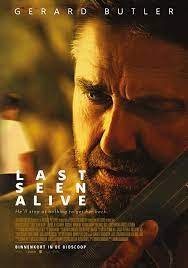 Directed by Brian Goodman.
Directed by Brian Goodman.
Few doubts about the title! Direct and straightforward. And, this action show, is very direct but has had few twists in the solution to the plot, an abduction plot, reminiscent of the Dutch film and its American remake of the past, The Vanishing.
And it is a film for Gerard Butler fans. Scots actor Gerard Butler (who should have been Jack reacher in the films of Lee child’s novels!) Has made a name for himself in the US with a series of action films for almost 20 years. This is one of the lesser ones, a kind of interlude before he takes on the next… Has Fallen.
There is a tantalising opening, a police officer threatening a rather scraggy redneck who tells the police that someone might be dead. And then the screenplay goes into flashback’s, highlighting the time and the passing hours.
We find an ordinary enough situation, a husband and wife with difficulties (Will and Lisa, played by Gerard Butler and Jaimie Alexander), some prickling is, she having had an affair, he devoted to her, she wanting some time and space for herself and he to drop her off at her parents home.
They stop at a service station to fill up. She goes into the store to buy something, is glimpsed and then disappears. The server behind the counter (and should keep the change is a tip) denies any knowledge of her. Will searches, it more more frantic, drives around looking for her, calls the police who eventually come, though, in the meantime, he has gone to her parents home upsetting them.
When the officer comes (Russell Hornsby), he takes notes, and, although we know different, is at first suspicious of Will himself, learning of the wife’s affair and its effect on will, learning that Will is wealthy and is a real estate developer.
Then comes some leads and suspicions, the man at the counter in store, the handyman who works for the parents. Which leads to quite a twist, especially as Will becomes more and more frustrated and anxious, not following police recommendations, looking as if he had been watching Gerard Butler action films too much… And then we find ourselves in the woods, a method for laboratory, all kinds of odd boards working there.
Some shooting, some bare knuckle fighting, some police intervention, some reconciliation.
Perhaps a bit of the abduction formula – but that is what many audiences enjoy.
- The title? Direct? Indicating action?
- Locations, the countryside, water, land, forests, the meth lab, suburbs, homes, service station, store? The musical score?
- The situation, Will and Lisa, in the car, the tensions, the revelation of her affair, his work is a real estate valuer, separation, his not wanting it, dropping Lisa at her parents? Stopping at the service station, her going inside, buying the water, the change for the attendant? Glimpsed talking, the truck, her disappearance?
- Will, disturbed, becoming more frantic, the search, the denial by the store attendant, Will driving around, phoning the police, going to visit Lisa’s parents, their attitudes? The police, the discussions, suspicions on will, interrogation?
- Will acting on his own, driving, the handyman at Lisa’s parents’ house, following him, the police, speeding charge, the handyman’s body in the boot? The police interrogating him, his role in the kidnapping, wanting to make money?
- Will, running through the forest, the encounter with the guard, going to the meth lab, the range of people, behaviour, the laboratory? Frank in charge? Finding the attendant? Confrontations, shootout, deaths? Finding Lisa and rescuing her? The arrival of the police? Will being let go?
- The effect, the future?
Little Tornadoes
LITTLE TORNADOES
Australia, 2021, 90 minutes, Colour.
Mark Leonard Winters, Sylvia Colloca, Robert Menzies, Fabio Motta, Minnie Liszukiweicz, Freddy Liszukiwiecz, Julie McGregor.
Directed by Aaron Wilson.
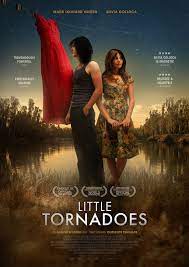 This is a surprising, quiet, almost intimate, visit to a small town in 1971, Tocumwal on the River Murray.
This is a surprising, quiet, almost intimate, visit to a small town in 1971, Tocumwal on the River Murray.
We are invited to identify with the central character, Leo (played by the very versatile Mark Leonard Winters). This is not easy. He seems very introverted, laconic. His wife has suddenly left him to go to family in Melbourne. He is left with his young daughter, Maudie, and son, Jack. He works in a local machinery factory, seems efficient at his job. He has one friend, an Italian, Tony, but Leo keeps to himself, taking the children to school, reading to them, not very friendly with the workers, going to the pub only once later in the film to play pool with Tony.
The radio plays often during the film and so we pick up on the time, Billy McMahon as Prime Minister, Gough Whitlam, Leader of the Opposition, the Vietnam war.
For those who remember the time, this is a welcome return, small but a reminder of how people were, the politics of the time, the war – but not expecting the changes that would come at the end of 1972. For those audiences for whom this period is before their time, an opportunity to look at quiet Australians.
The film has a voice-over narrative, in Italian and English, from Maria, explaining how she came from Italy to Australia, memories of her dead husband, Lorenzo, migrant hopes but finding herself in the country town. Tony suggests to Leo, who is not a good cook at all, that Maria might be able to look after the children in the afternoons and prepare the evening meal. Since the children are waiting for a phone call from their mother, they are in initially hostile to Maria. But, in no time, she overcomes the barriers, has some cooking and enjoying her meals (Maria played by Silvia Colloca, who has her own television cooking program on SBS, so not too much of a stretch!), Leo very grateful. But reticent.
The other strand is Leo’s memories of his mother’s collapsing and dying, the visits to her grave – and Maria thinking was neglected and tidying and cleaning the headstone. And there is his father, Robert Menzies, a brief flashback to a Japanese attack in World War II, some moments with his driving the tractor and a paddock, plane flying over and his memories again of the war. Leo visits, takes the children, but if Leo is reticent, his father is taciturn and uncommunicative. There is a telling moment indicating changes in Australia when Leo leaves a container with one of Maria’s meals, his father refusing to eat it – but, hungry, eventually doing so, turning up to turn take the children to school.
There are some momentary groups glimpses of little tornadoes, but they are symbolic of the little tornadoes the blow up in our lives. (Interestingly, novelist and commentator Christos Tsiolkos collaborated with the writer-director, Aaron Wilson, for the screenplay).
- The title? Literal tornadoes? Metaphor?
- The town of Tocumwal, the Murray River, the Riverina, the farmlands and crops, the town, homes, the bar, the factory, interiors? The atmosphere of 1971?
- The radio voice-over, information about the polities, Billy McMahon, Gough Whitlam, the Vietnam war…?
- The focus on Leo, his age, personality, memories of his mother collapsing, dying, visits to her grave? His father, taciturn, World War II experiences? Working the farm? Leo and his marriage, his wife walking out, his phone calls to her sister, the wife not calling? The two children, love for them, care for them, emergency meals, reading to them, their wanting their mother?
- Leo as laconic, introverted, at work, doing his job, not mixing much with the workers, his friendship with Tony, lunch together? Tony and his suggestion about Maria, her coming, the children wary, the quick communication, cooking the pasta, the good meals, bonding?
- Maria, from Italy, her voice-over, Italian and English, her experience, dead husband, hopes, in Tocumwal, appreciating the job, bonding with the children, with Leo, but her leaving?
- Leo, the visits to the cemetery, with his father, giving’s father the pasta, the father not eating it, refusing, later changing his mind? The father, the memory of the Japanese attack, memories of the planes, keeping to himself, driving the tractor, eating the pastor, coming in taking the children to school?
- The characters of the children, their behaviour, together, with their father, going to school, the stories, concern about their mother, her phone call?
- Leo, going to the bar with Tony, playing pool?
- A glimpse of quiet Australians, the countryside, in that period?
MSC Education, 2022. Annual General Meeting and Photos
MSC Education, 2022. Annual General Meeting and Photos
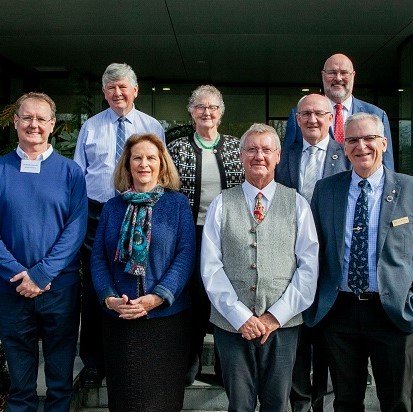
MSC Education: Each of our four MSC schools is a separate incorporated entity with its own Board of Directors. The Education Members’ Council (EMC) act as the Company Members for these companies. The Schools’ Company Meeting & AGM were held at Daramalan College. Since Sun afternoon until this afternoon there were also meetings of:
- Education Members’ Council;
- The Schools’ Business Managers;
- The Education Committee (made up of Principals and Assistant Principal-Mission);
- Meeting the Daramalan staff; and,
- Sharing Eucharist together.
The MSC involved in the past two days were, Chris McPhee, Barry Smith, Bob Irwin, John Mulrooney and Peter Hendriks. Chris attended the above AGM and presided at yesterday’s Eucharist.
Photos
The assembled group - Bob Irwin msc was an apology at photo time as were James MacKenzie (Monivae Board Chair) and Phillip Lane (AP Faith and Mission, Chevalier College).
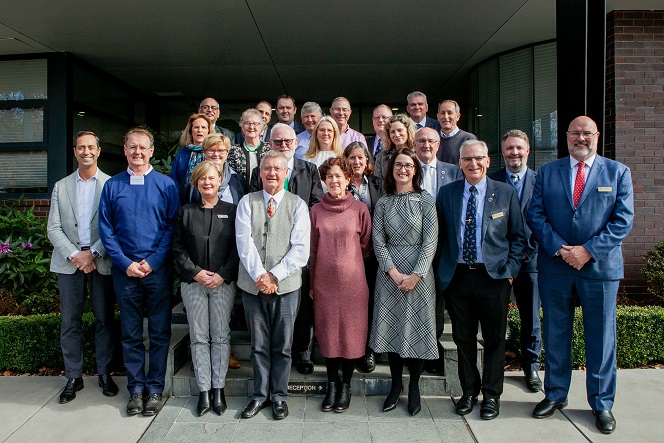
Board Chairs: Julie Raitelli (Downlands), Chris Merlino (Chevalier), and Adrienne Day (Daramalan).
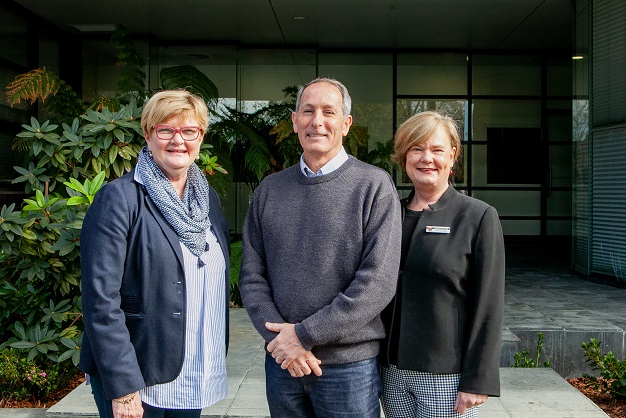
Business Managers: Ian Mendes (Downlands), Andrew Mir (Province Office), Hugh Boulter (Daramalan), Jacqui Daley (Chevalier), Jim Bailey (Monivae) and Will Rowland (Chevalier).
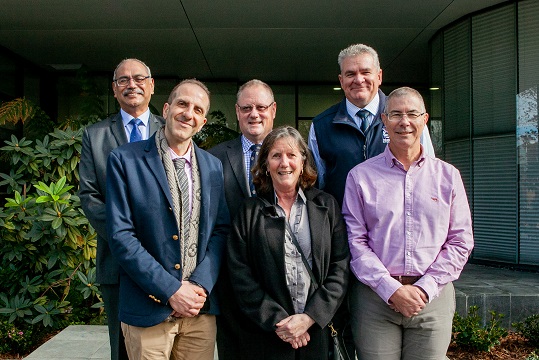
Principals: Jonathan Rowe (Monivae), Rachel Davies (Daramalan), Stephen Koch (Downlands), Chris McDermott (Chevalier).
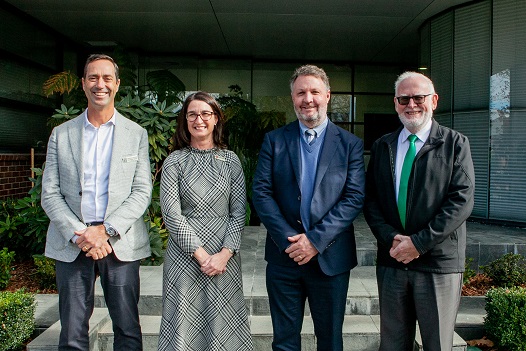
MSC present: Barry Smith, Chris McPhee, John Mulrooney, Peter Hendriks.

MSC Education Members’ Council: Peter Hendriks, Phil Fitzgerald, Rita Daniels, Anne Benjamin, John Mulrooney, Barry Smith, Mark McGinnity, Chris McPhee.
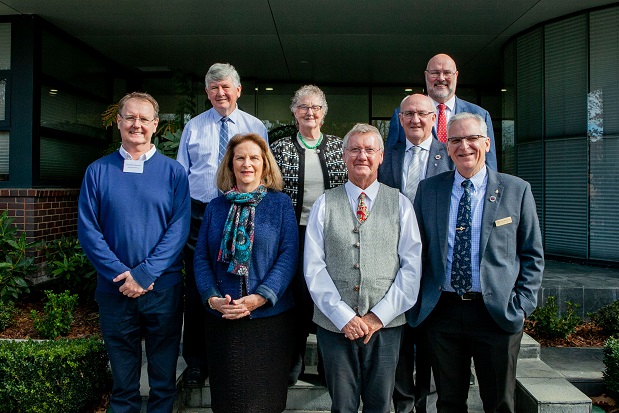
Staff Formation Network: Cheryl Hamill (Daramalan), Danny Franc (Monivae), Andrea Collins (Downlands), Anne McAtomney (Chevalier Institute), and John Mulrooney (Chevalier)
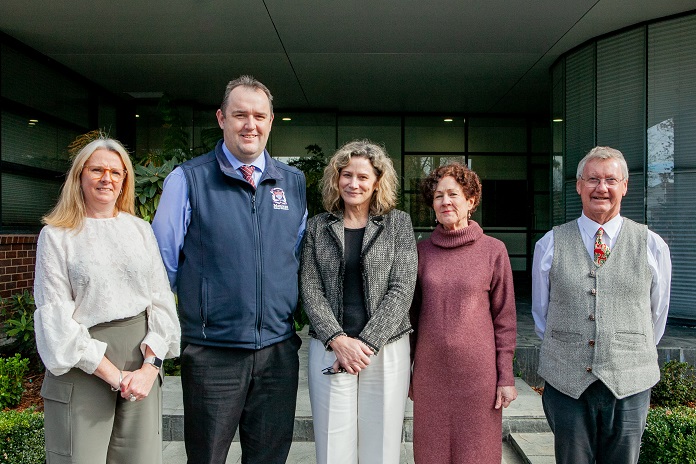
As I Look Back. Malcolm Fyfe MSC on the occasion of the 60th anniversary of his ordination, May 25th.
As I Look Back. Malcolm Fyfe MSC on the occasion of the 60th anniversary of his ordination, May 25th.
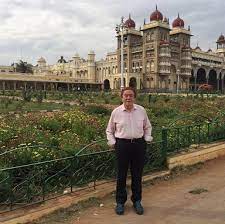
- Just prior to ordination Malcom was appointed to Monivae College, Hamilton (1961 to 1977). He was headmaster and Superior (1969 to 1977) and taught Mathematics (Pure, Applied and General) for 14 years.
- He was appointed to the Diocese of Darwin, (1978 to 1983) where he was Director of Catholic Education, Episcopal Vicar for Catholic Mission and Superior.
- Malcolm was then appointed to Bangalore (1987 to 2003), to set up MSC Seminary and Congregation.
- From 2005 to present Malcolm has been in Darwin where is currently Vicar General.
Malcolm wrote these memories for the Monivae Magazine, The Dolphin"
Just a little history to start with: as most readers of this article would know, Monivae College was founded by the Missionaries of the Sacred Heart in 1954 and for its first two years used premises out on the Port Fairy Road. The College moved to its newly established campus on the Ballarat Road site at the start of 1956. So, it was to quite a young educational institution that I, in January 1961, while still a trainee for the priesthood, was appointed. Together with Brother Noel Mansfield, I was driven out from Melbourne on a fearfully hot Summer’s day by the then Rector, Father John J. McMahon MSC.
The title, Rector, combine two roles. One was that of Religious Superior of the missionaries of the Sacred Heart, of whom there were then about 24 Priests and Brothers resident at Monivae; the other role was that of Headmaster of the College. The journey from Melbourne to Hamilton on that January day seemed endless and I had little idea of what I was heading for and no idea of what lay ahead of me. Monivae was to be my home for the next 17 years. Within eight years, I myself was appointed the College Rector.
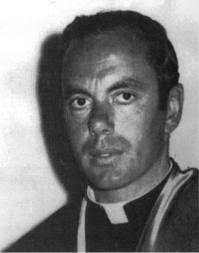
Meantime I was ordained a priest on 25 May 1962 by Archbishop Justin Simonds at the (then) Sacred Heart Monastery, Croydon, Victoria. I taught Senior Mathematics (Pure, Applied and General) for 14 years, filled in as a teacher of other subjects, pretended I could be a junior football coach, promoted and trained the Students Choir, composed two Monivae Mass Settings and the musical score for the original College, “Monivae College, We Hail You with Pride…”. From 1965 to 1968 I was the Senior Boarding Master for the 300 all-male boarders. Then I was appointed Headmaster of the College and Religious Superior for the MSC Community, roles I had for the next nine years. During the last six years of my time there were we were able gradually to change from having an all-male student body to being a co-educational Boarding and Day College.
What happened then?
Briefly: On finishing up at Monivae , I was appointed to the Northern Territory with for six years I was the Director of Catholic Education, Vicar for Missions and the Religious Superior for the 25 or so MSC Priests and Brothers working there. In 1982 I was asked to undertake a study of the feasibility and advisability of setting up our MSC Congregation in India. After two years of study in Rome, I was asked to “walk the talk” and thus began my 17 years stretch in India. Much later, with the Congregation established there, I handed over the reins to one of our Indian MSC priests and return to Australia, more specifically, to Darwin. After another 17 years, I’m still here. Again, I have had several portfolios but for many years now I have been what’s known as the Vicar General of the diocese.
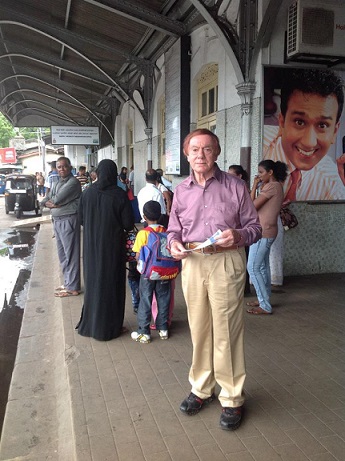
So, what did I encounter at the end of that seemingly endless car trip in 1961? I found a vibrant and friendly MSC Community as well is a group of dedicated lay staff. We knocked a lot of fun out of our experiences in the classroom and the extra-curricular activities. The students were friendly and so it seemed to me, happy on balance, to be there: for the boarders it was pretty much a home away from home. They came from rural-based families for the most part. Cadets and sport were very much important. Monivae students excelled in both.
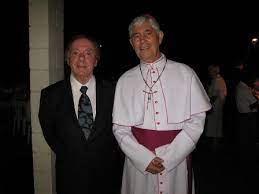
For many years Vicar General for Bishop Eugene Hurley, now for Bishop Charles Gaucici.
I haven’t had a great deal of interaction with Monivae College since my departure 44 years ago. From time to time, I receive a phone call or a letter or a visit from a former student, often enough to let me know that in spite of any misdemeanour they may have engaged in wild at Monivae, they have subsequently made a success of their life.
Some years back, while I was waiting to catch a plane at Darwin Airport, a well-built fellow came up to me and rather threateningly said, “you’re Father Fyfe. You expelled me from Monivae”. I asked, “Why did I do that?”. He replied: “You said I was…”. I said, “Well, were you?”. He said, “Yes, I was. Come and have a drink!”.
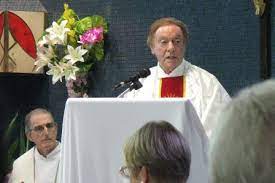
You can view the Jubilee mass at 11am Darwin time (11:30 Syd/Melb time) via Facebook or via the Diocesan website
Welcome to Nang as he begins his pre-Novitiate formation at Blackburn.
Welcome to Nang as he begins his pre-Novitiate formation at Blackburn.
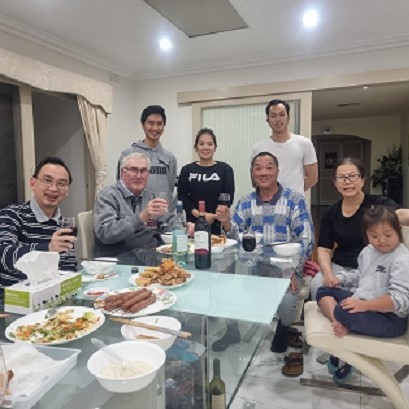
Frank Dineen, with Khoi and Trieu visit Nang’s family in Noble Park.
Nang writes: " I was born in a Catholic family with six siblings and I am the youngest in my family. My parents and I moved to Australia two and a half years ago. In Australia we also have one sister (married) and one brother, besides that 2 brothers (married) and a sister in Vietnam.
I got to know MSC through many surprises and the first person I talked and met was Fr. Danh and Br. Trieu. They talked to me about the path of the MSC congregation. I realise that the way of the Congregation is to recognise yourself and God's boundless loving heart. That's the main thing that makes me feel God's call to me there, in my heart, and in God's love.
After being guided by Father Khoi for a while, I really knew what I wanted, needed, and should do. Moreover, everyone's prayers that have helped me stay strong on the current path. Currently I am a pre-novitiate student of the MSC congregation and I am also an English student at ELSPM (YTU’s English as a Second Language for Pastoral Ministry course). I am very happy to be a member of MSC congregation. Thank God and the congregation for accepting me."
International MSC Latin American Studies
International MSC Latin American Studies
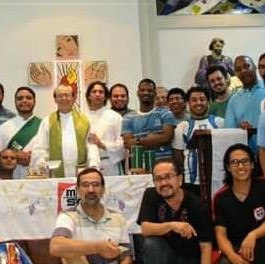
After the post last week about our Canadian Province merging with the Dominican Republic Province, some further news of studies and challenging pastoral work in El Salvador
By Juan Gabriel C. Estévez , MSC, Dominican Republic Province
The Latin American Theologate in El Salvador is a project of the Congregation that arose from the idea of several MSC, who sought to unite in the same place the young people who are in the last stage of formation in the different MSC Provinces of Latin America. They thought that this work would be a great advancement for the Congregation, since sharing the same formative stage opens us to fraternal relationships between the different cultures and inserts us in the shared mission. The headquarters of the Theologate is in El Salvador and is called Casa José María Gran, in honour of the Blessed missionary murdered in Guatemala.
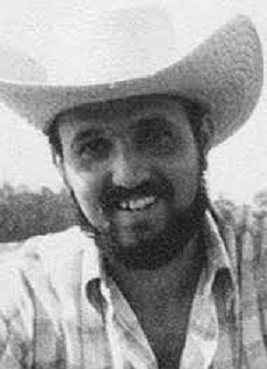
In August 2014, the Theologate was opened, welcoming six young religious in formation, five of them from Central America and one from the Dominican Republic. Over the years the group has increased. In this last stage of formation we are accompanied by a team of formators composed of two priests. The nationalities that have made up this international community have been: Brazil, Colombia, Guatemala, Haiti, Nicaragua, Paraguay, Peru and Dominican Republic.
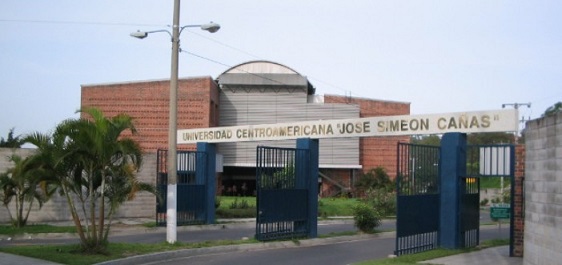
We did our theological studies at the Universidad Centroamericana "José Simeón Cañas" (UCA). While we prepare ourselves intellectually, we put our mission into action by collaborating in the various communities and pastoral work of the San Luis Gonzaga Parish as well as, in the recovery house for alcoholics, La Esperanza, coordinated by the MSC of Central America.
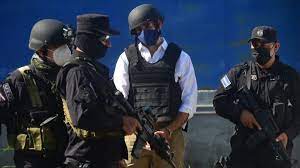
Our presence has also had an impact together with the Prison Pastoral in the Mariona Penal Centre
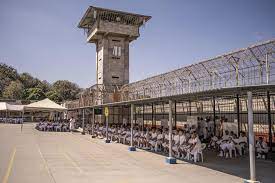
and the Migrant Pastoral in the Migrant Attention Centre known in El Salvador as "La Chacra".
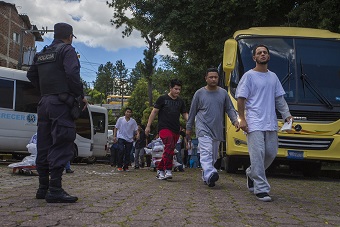
Other pastoral work in which we have participated has been in the Divina Providencia Hospital, a place where people in the terminal stage with cancer are being cared for. Through the known parishes, we have been involved in evangelisation work in Honduras, Nicaragua and in the indigenous areas of Guatemala.
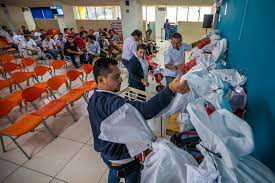
As the years go by, we are seeing the fruits of this Theologate. Currently, there are thirteen companions who have already received their ministries, eight of them are priests and five are transitional deacons. The most recent ordained was Jesús De León Mercedes, Noelito. He was the first of the Dominicans to be initiated into the Theologate. With our missionary presence in El Salvador, we continue to make known "the love that God has for us" under our motto: "The Sacred Heart of Jesus be loved everywhere, Forever!
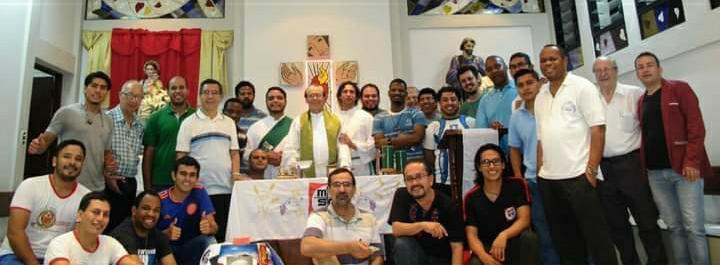
Provincial Conference, Mission, to be on earth the heart of God.
Provincial Conference, Mission, to be on earth the heart of God.

Key paragraphs from Chris McPhee’s opening address:
You are the light of the world… If someone were to ask me, in one sentence, what would you see as our mission? I would answer them in this way… that we, you, and I, each of us, in our own way, become on earth the heart of God. As simple as that may sound and as hard as that may be… that is it… to be on earth the heart of God… your heart reflecting God's heart to our world.
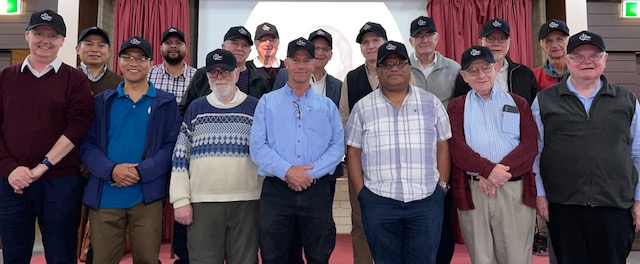
More than ever, the world, the church, our community, needs more people of heart, more people of heart to spread the love of God instead of the law, to be a sign of hope and contradiction rather than authority and legalism… to be that heart - in a world that is hungry and ignorant, and spending more money and talent and time on the potential destruction of the world … more than ever do we need to be people of heart.
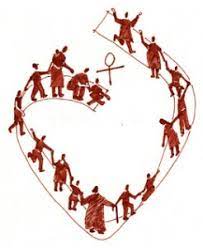
We have been sent to be a heart, a light into a world, we have been sent into a Church, a community, a mission that says the divorced and remarried, the homosexual, and women are inadequate images of Christ… in a world that discriminates against race, gender, disability, sexual orientation, refugees, different religious traditions, the aboriginal and any other bigoted beliefs about a group of people, that separates and divides the world into those who are in and those who are out… all of us, as Missionaries of God’s Heart, we have been sent to restore, to welcome, and to accept difference, as being the very image of God's self… and in fact each of us, know that we have been sent to turn the world around… one heart at a time…
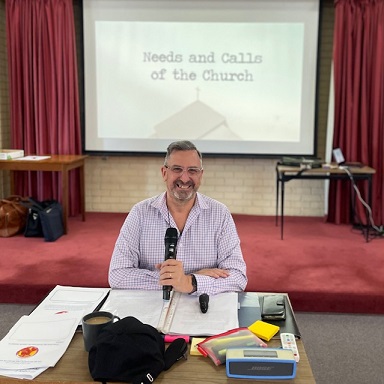
Br Peter Ryan FSC (De La Salle) facilitated a day of formation for the Conference members. Peter has produced a PhD on how to live a Charism of a Religious Congregation in changing times. We were able to explore what it means to live our MSC charism in such times.
A critical question for religious life today is whether we are still at the margins and peripheries. Are our places of ministry where we are wanted, or are they where we are needed? There is an old Maryknoll adage: “They came where they were needed but not wanted and stayed until they were wanted but not needed”.
A frank and heartfelt discussion took place regarding the inevitable position of not having enough MSC to place in the ministries in which we are currently involved. With thanks to Peter Hendriks for the photos - this one is from the archives.
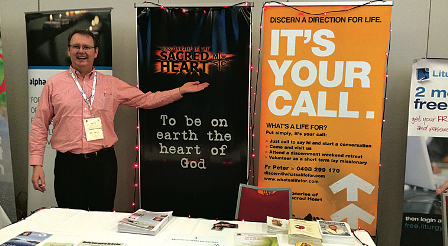
Benediction
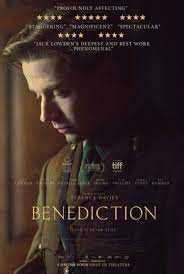
BENEDICTION
UK, 2021, 137 minutes, Colour.
Jack Lowdon, Peter Capaldi, Simon Russell Beale, Jeremy Irvine, Ben Daniels, Kate Phillips, Julian Sands, Geraldine James, Gemma Jones, Anton Lesser, Calam Lynch, Lia Williams, Kellie Shirley, Suzanne Bertish, Joanna Bacon, Richard Goulding, Matthew Tennyson.
Directed by Terence Davies.
This review begins with a suggestion, not ordinarily made – that audiences intending to watch Benediction do some research, reading about the poet, Siegfried Sassoon, to fill in a lot of the background of the film. Ordinary advice would be the opposite but this film is a kind of impressionistic portrait of the poet, visual, verbal with his poetry, pieces of narrative, but with flashbacks and flashforwards. The narrative is not the most important part, rather the portrait, the war experience and memories, the poetry are key.
Older audiences would be more at home in the early part of the 20th century, the experience of World War I, emergence from war, the roaring 20s, especially in London society. There are references that audiences, 100 years later, may not be familiar with: Stravinsky and the Rite of Spring, sequences with the poet Edith Sitwell, references to the music of George Gershwin, the composer and performer, Ivor Novello (and a performance of his amusing ditty, “and her mother came to…”, dancing to Tea for Two, the Charleston, Oscar Wilde and his friend Robbie Ross…
This is very much a Terence Davies film, written and directed by him. He has been making some excellent films for almost 40 years but they are not to everyone’s taste. Too quiet for some, too precise for others, particularly delicate sensibility in presenting characters, their complexities, their struggles.
And, yet, there is quite some ferocity in this film. Siegfried Sassoon served for over two years in World War II, in the trenches, eventually taking a stance against what he thought was the mismanagement of the war, sent to an institution (fictionalised interestingly in Pat Barker’s novel and the film version, Regeneration). What the director does is to insert a considerable amount of war footage, soldiers, assemblies, parades, the fierce fighting, wounds and the mass dead lying in the mud. These are the images that haunt Sassoon throughout his life and permeate his poetry.
Jack Lowden gives a very strong performance, nuanced, as the young Sassoon. And Peter Capaldi appears as the older Sassoon (flashbacks/flashforwards). There is a strong array of British character actors in support, some of them more visibly older after decades in films, Geraldine James, Ben Daniels, Gemma Jones…
And, pervading the film, is Terence Davies’ gay sensibility, prominent in a number of his films, especially the autobiographical The Long Day Closes. The era in Benediction is immediate post-Oscar Wilde, Sassoon quoting ‘the love that does not speak its name’ to his doctor (Ben Daniels). And Sassoon’s prominent friend is Robbie Ross (Simon Russell Beale), Oscar Wilde’s friend and Catholic confidant. Sassoon came out, in the secretive way of the period, a number of affairs, including with Novello, Jeremy Irvine (and Terence Davies obviously dislikes, almost creating a caricature and accusing him of arrogance and pettiness).
Eventually, Siegfried Sassoon married and had a son. There is a wedding sequence and the support of his gay friends. But, into the future, there is tension with his wife, separation, the devotion of his son, even to his increasingly cranky and crabby father. This is illustrated by a visit from his former lover, Stephen, who 30 years later wants to apologise but is ousted from the house.
In a final sequence, in the 60s, Sassoon nearing 80, his son takes him to the West End to a performance of Leslie Bricusse-Anthony Newly’s Stop the World, I Want to Get Off (featuring the amusing ‘typically English’ song. We see Sassoon walk home, sitting on a park bench, remembering, transforming into his younger self, in uniform, sitting, sad, eventually weeping. (And one wonders whether Davies himself regrets that he did not live in the England of a century ago where he seems more at home.)
At the end of this experience, we might be wondering why the film could be called Benediction – ultimately, Sassoon did not seem to be blessed (although, for Catholic interest, he became a Catholic in his older age, instructed by the translator of the Bible into English, Msgr Ronald Knox). Perhaps it is a benediction to have lived, to have survived, and to be able to remember as well as regret.
- The title? What benediction? For whom? Or not?
- The work of Terence Davies, quiet, sensibility, the past, poets and artists, gay sensibility and stories?
- The period, World War I, the front, the war footage? In the UK, rehabilitation centre? Homes, society, socials, art and poetry, theatre? Flashbacks, flashforwards, the 1960s, the house, the theatre, the London Park?
- The range of music, opening with Stravinsky, Gershwin, Ivor Novello, Tea for Two, the Charleston, Stop the World…?
- A portrait of Siegfried Sassoon, audience knowledge of him, his war career, protests, his poetry, his life, relationships, marriage, son, conversion to Catholicism? His poetry, as background, his recitation of the social, Wilfred Owen’s poem, Disabled, visualised at the end?
- The extensive use of war footage, reminder of the impact of World War I, the soldiers, recruiting, training, the trenches, wounding, the dead lying en masse, rehabilitation? The insertion throughout the film? The influence of these memories on Sassoon, his life, his poetry?
- The narrative in this context, relationships? The future, the marriage, in the church and his son, George, and his conversion, the question about Catholicism? The breaking of his marriage? His son caring for him, the conflicts, his going to the theatre, the song? Walking home, sitting on the park, the flashback to his younger self, uniform, weeping?
- Sassoon, joining up, his younger brother, news of his death? His relationship with his mother, living with his mother, Novello visiting her, her concern about his relationships?
- Enlisting, his war service, over two years, later going to the front, being wounded by the British soldier? His nightmares of the hospital, the man screaming in the night, the nurses, his being dead in the morning?
- Protesting against the management of the war, his being call before the panel, the three and their attitudes, treatment of him, military superiority, sending him to the institution? His meeting with Dr Rivers, friendly and sympathetic, listening, treatment of mental issues, the confiding about the sexual orientation, confidentiality? Meeting Wilfred Owen, his poetry, the effect of disabled on Sassoon, their dancing together, the official condemning men dancing together? Owen recovering, sent to the front, being killed just before armistice? The continued memory?
- After the war, Sassoon and his relationships, Glen Byam Shaw, the meeting with Novello, his recitation, Novello’s song – and her mother came too! The affair, the previous partners, Sassoon going to the theatre, not on the list, going up, the new partner, Novello’s attitude?
- The relationship with Stephen, his position in society, meeting Hester, dancing the Charleston, later meeting with her, the church and watercolours, the attraction, his decision to marry, talking with his friends, the minister and the ceremony, the birth of the baby, his joy, later, the visit from Stephen and his rejection of him, ousting him, Hester making the tea? Her leaving? Leaving him with George, the living together, George caring for him, the arguments and his bitterness? Taking him to the theatre?
- Robbie Ross, the past with Oscar Wilde, his place in society, his friends, the society women, making advances on Sassoon, his preferring cocoa! Lady Ottoline and the recitals? The meeting with Edith Sitwell and her recital? His later resentment about her Nobel award and his Queen’s poetry award?
- The years passing, Sassoon’s attitude to music, the praise of Gershwin, Tea for Two, the meeting with Hester and the consequences?
- The device of the flash forward, Sassoon looking in the mirror, his older self, in the church, the conversation about conversion, George and his not being spiritual? Why Catholicism?
- The design of the flash forward with Stephen, ageing, the same scarf, his visiting Sassoon, wanting to reconcile, 30 years, his being ousted?
- The finale, the visualising of Wilfred Owen’s poem and the legless man, disabled? Sassoon at the theatre, George leaving him, sitting on the park bench, going back to his past, in uniform, his weeping?
A Chiara/ To Chiara
A CHIARA/ TO CHIARA
Italy, 2021, 121 minutes, Colour.
Swamy Rotolo and members of the Rotolo family, Fumo family.
Directed by Jonas Carpignano
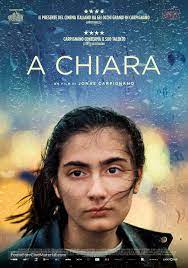 This is a rather different Mafia story, a focus on a family in southern Italy, and especially on Chiara, 15 years of age. The setting is very local, a small town away from Reggio Calabria, the ordinariness of life in the town, family and friends, connections, school, and birthday celebrations.
This is a rather different Mafia story, a focus on a family in southern Italy, and especially on Chiara, 15 years of age. The setting is very local, a small town away from Reggio Calabria, the ordinariness of life in the town, family and friends, connections, school, and birthday celebrations.
There are some family resemblances in the cast – and we discover that most of the performers are amateurs but the central characters all belong to the same family.
A word of warning for prospective audiences: just as when there are flashing lights, strobe lights, a warning is often given that this may have an effect on the audience watching. For almost 20 years, especially with some small-budget local horror films, the use of the handheld camera has become very popular. Here it is used throughout the film, the audience very conscious of the handheld effect of the camera, the continued movement, jerky and unpredictable, from one character to another, a great number of close-ups, extreme close-ups. It may mean that an audience can be more focused on the technique of the handheld camera,, physically and psychologically, than becoming involved in the narrative and the characters.
One blogger noted, aptly: I didn't like the handheld shaky cam cinematography. I thought it was inappropriate for the story and made it difficult to get perspective on the settings.
The audience is immersed, involved because of the handheld camera, in the life of the family in a small town, quiet father, household-busy mother, sister turning 18, and a little girl, boisterous and irritating, but a strongly bonded family. Then about 20 minutes is given over to the sister, Giulia, and her 18th birthday party. We live the life of the family – a little puzzled because the father, reticent, draws back from toasting his daughter.
Then a huge transition. The father’s car is blown up in the street. He disappears. And the drama for Chiara is that she learns about what has happened, his Mafia background, from social media. Her mother is not forthcoming. Giulia does not wish to explain.
There are further repercussions for Chiara, social services coming to visit the school and her family, the proposal that she be fostered out because of the trouble – and, it emerges, that many of the relatives and connections in the town are also involved.
There is a sequence which brings home to the audience some of the detail, small details, of Mafia activity. Chiara seeks out her father, finds him hiding in an underground bunker, equipped with considerable surveillance techniques. But, he invites her to accompany him on the process of making the contacts, collecting the drugs, the payments for the drugs, the processing of the drugs, the new packaging, the distribution and repackaging, the profits.
One thought is that after this explanation to Chiara and her experience, and her previous devotion to her father, it might mean that Chiara herself will take on the family tradition of Mafia and drug dealing.
The ending is upbeat, more positive, a different celebration as Chiara turns 18.
- The title, the role of Chiara? The literal meaning, too? The meaning also of how this pertains to Chiara?
- The cast generally as amateurs, the members of the one family, their working together?
- The setting, southern Italy, the town, school, the seaside, homes, underground bunkers, the beach? The contrast with Urbino? The finale and society? The musical score, local music?
- The style, handheld camera, continued movement, the effect on the audience, close-ups, extreme close-ups – and sometimes a relief in a widescreen scene? The cumulative effect of this style, especially during the birthday party?
- The introduction to Chiara, her story, age 15, at the gym, coming home, the cosiness of the family, the mother working, the father rather more restrained, Giulia turning 18, Georgia and her mischievous behaviour, rowdy and irritating?
- The party, Giulia at 18, long sequence, the detail of the party, the guests and their relationships, talking and laughing, the music, the food, each member of the family, the urging of the father to make a toast, his reticence, the other members of the family?
- The aftermath, the bombing of the car, the father disappearing? Chiara learning the news about his Mafia connections from social media? The effect on her, her talking with her friend, at school, asking her mother for the truth, the mother’s reticence, asking Giulia, her not wanting to explain? The change in Georgia, now a quiet and moody?
- The background of Mafia dealings in southern Italy, the locals, drug deals, the capos and their authority, murders? Chiara and her discovery of the underground bunker in the home? The later discovery of her father’s bunker, going to see him, Antonio and the driving, the father taking Chiara with him, the meetings, the drugs, the treatment of the drugs, the repackaging, the distribution…?
- Chiara, her behaviour, social services coming, at school, the interview at home, the prospect of her being fostered out? Her running away, the contacts with her cousin, the visit to the bunker? Its effect on her?
- The passing of time, her 18th birthday, not with her family, the new family, friends, prospects, the celebration, at the sea with her friends, the drinking, the drugs, her finding a place?
